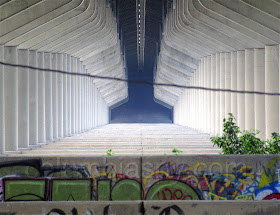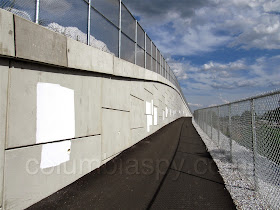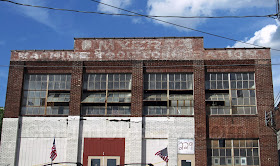It's amazing what paint can do. It can beautify. It can "uglify." It can conceal. Here are a few examples:
Meanwhile, under the Wrights Ferry (Route 30) Bridge, the multi-paneled graffiti exhibit is being painted over, as shown here and below. It's just as well, since there's no evidence of a budding Keith Haring or Jean-Michel Basquiat.
Graffiti on the pillars has also been painted over to eliminate the "uglification" factor.
On the wall leading to the trail, as well.
Finally, this ghost sign at North Second and Bridge could stand to be revived. It reads: "Myers Machine Tool Corporation"
A few tidbits about the company can be found HERE.










Awesome Documentation again!!!
ReplyDeleteI just snapped a pic of anti freeze spilled on the 100 Block of South Second Street by,,,
Of course before street maintenance on Tuesday I'll get a better picture, it may be oil.
Either way, it's not good.
Hopefully,this will spur others to spruce up their properties if needed and within their financial means.
ReplyDeletewhy in the heck don't any of the cameras show who does this stuff??????????? Norm spent a ton of $$$$$$$$$ on them.
ReplyDeleteNorm who?
ReplyDeleteTry Fricke's Hardware for quality and affordable paint.
Can we get some pictures of the Indian Villages that were here before the evil men that constructed these buildings slaughtered them ?
ReplyDeletehttp://www.pacapitol.com/vc/visitor_info/pa_history/whole_pa_history.htm
ReplyDeletehttp://historymatters.gmu.edu/d/4929/
ReplyDelete"Beginning in 1887, the federal government attempted to “Americanize” Native Americans, largely through the education of Native youth. By 1900 thousands of Native Americans were studying at almost 150 boarding schools around the United States. The U.S. Training and Industrial School founded in 1879 at Carlisle Barrack. Pennsylvania, was the model for most of these schools. Boarding schools like Carlisle provided vocational and manual training and sought to systematically strip away tribal culture. They insisted that students drop their Indian names, forbade the speaking of native languages, and cut off their long hair. "
ReplyDelete